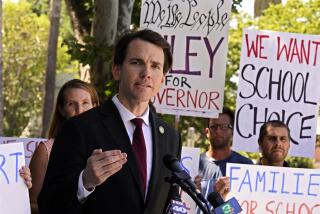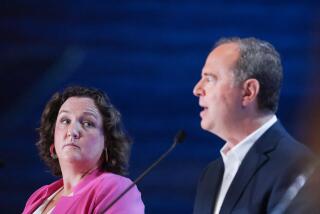Ailing Campaign May Get as Much as $940,000 : Agency Certifies Hart for Federal Funds
- Share via
WASHINGTON — The Federal Election Commission on Monday certified Gary Hart’s presidential campaign as eligible for federal matching funds, clearing the way for his revived but financially strapped campaign to receive $100,000 early next week.
The funding, which the commission approved unanimously, is the first installment of what Hart aides say could be as much as $940,000 in matching funds, based on money the Democratic candidate raised before dropping out of the race last spring amid controversy over his relationship with a Miami model.
The commission decision effectively restored a major source of campaign finance that was frozen after Hart’s sudden withdrawal. Hart had petitioned the FEC for the matching funds, but the commission ruled that he was not eligible because he was no longer a candidate.
‘Threshold Submission’
FEC spokeswoman Susan Snyder said the commission approved Hart’s “threshold submission” showing contributions of $141,285--well over the $100,000 minimum needed to become eligible for federal matching funds--after the former Colorado senator sent a letter Dec. 19 declaring officially that he was back in the race.
The ruling is “great news,” acting Hart campaign manager Susan Casey said. The matching funds will help to pay for vital campaign costs, she said, and the certification itself will guarantee Hart a spot on the primary ballot in South Dakota and other states.
In another boost for the campaign, Hart supporters in Illinois beat Monday’s deadline and filed enough signatures to put his name on the state’s March 15 primary ballot.
Supporters have been scrambling since Hart re-entered the race Dec. 15 to get his name on the ballot in several states, and Illinois had been considered a major hurdle because of the early filing deadline and its requirement that candidates be backed by petitions bearing 3,000 signatures.
Income Tax Returns
Presidential candidates win eligibility for federal matching funds by raising at least $5,000 in individual contributions of $250 or less in at least 20 states. Once a candidate is eligible, all individual contributions up to $250 are matched dollar for dollar by the Treasury. These funds come from the voluntary $1 checkoff on personal income tax returns.
Hart raised $2.2 million before he left the race last May, but estimates of the matching funds to which he is already entitled have varied widely, even within his own campaign.
Some campaign officials said last week that Hart would receive matching funds of $940,000, but Casey said Monday that even a rough estimate was not yet possible. She said the campaign hopes to receive at least $500,000 by the end of January.
Conflicting Demands
The infusion of federal matching funds, though essential for Hart’s candidacy, is likely to leave the campaign further torn by the conflicting demands of new expenses and old debts.
Hart has emphasized that his is a grass-roots candidacy, but he nonetheless has acknowledged that he must expand his frugal campaign operation. At the same time, he faces the persistent demands of creditors from his 1984 presidential campaign, who earlier this year filed lawsuits in an effort to recover an estimated $1.1 million.
Casey said most of the matching funds will be used to pay for plane tickets and phone bills at Hart’s campaign headquarters in Denver and in New Hampshire, where he is waging his most vigorous primary battle. But she said 10% of the funds may be used to pay part of the 1984 debt, if the FEC allows federal money to be used in this way.
Must Ask Again
Hart had earlier asked for permission to use the federal funds to pay off the old bills, but the commission declined to respond to the request after he dropped out of the race and has since said Hart’s campaign “will have to ask again.”
Casey said the campaign has “no specific plans” to renew the request but will probably do so “at some point later on, once we get a little farther in this process.”
The federal matching money will become available to Hart and 11 other major candidates next Monday. More than $25 million is to be distributed in the first transfers to Republican and Democratic candidates.
Of the 13 major candidates, only the Rev. Jesse Jackson has not yet been ruled eligible for federal matching funds. FEC spokeswoman Snyder said the commission staff has been working with the Jackson campaign to resolve “significant problems” with the candidate’s submission but said the agency hopes to take action this week.
More to Read
Get the L.A. Times Politics newsletter
Deeply reported insights into legislation, politics and policy from Sacramento, Washington and beyond. In your inbox three times per week.
You may occasionally receive promotional content from the Los Angeles Times.










